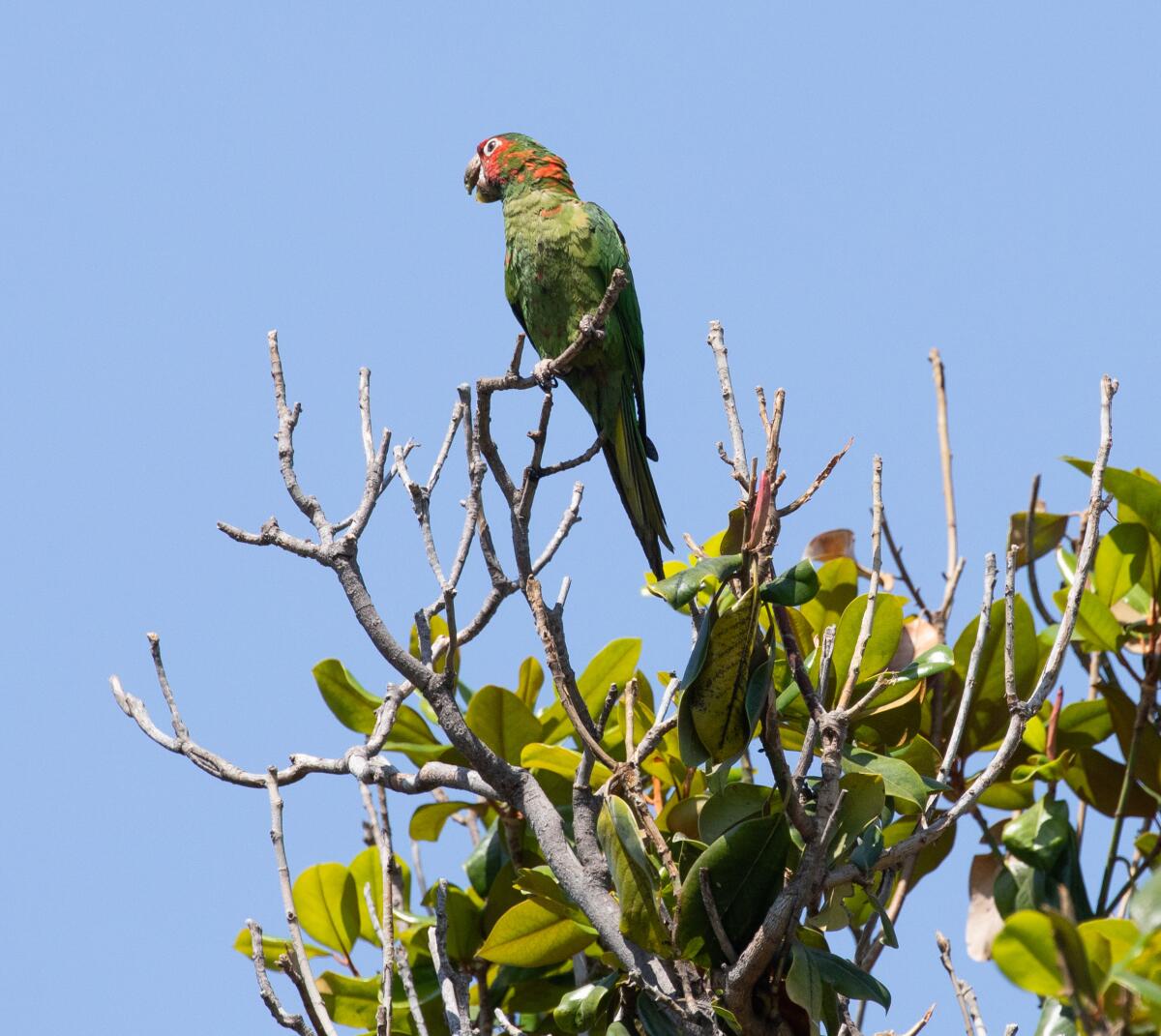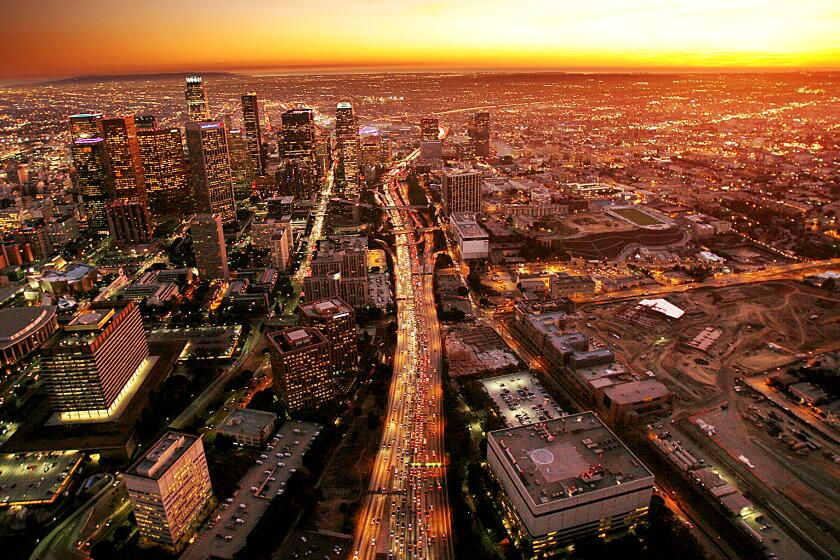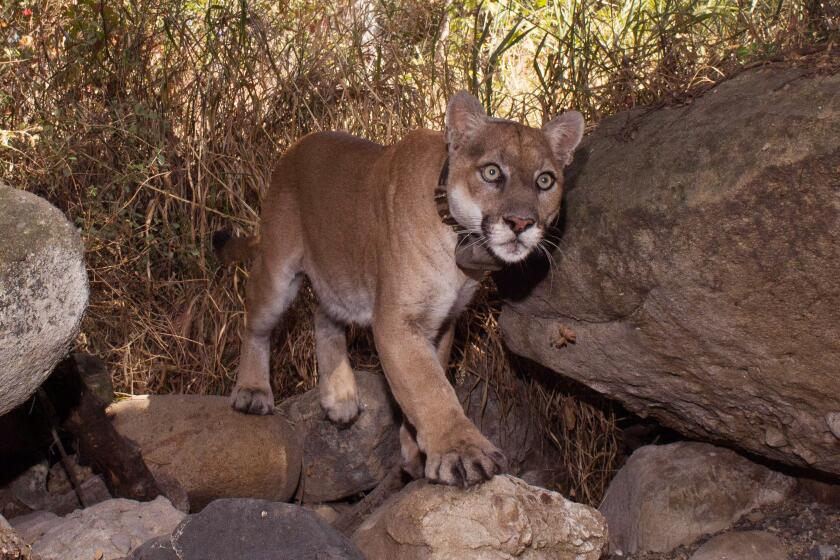Opinion: I love L.A.âs noisy parrots. Poachers should leave these wild creatures alone

Pandemonium found me when I moved to Alhambra in 2011.
No, really â literal pandemonium, as in a flock of wild green parrots. We have crows too, so you could say murder and pandemonium greeted us when my wife and I moved into the house where we would raise children.
Our city is a hub of avian superhighways and filled with glass buildings that birds canât see. Requiring bird-safe glass in buildings could help reduce fatal collisions.
And we love it. The parrots are noisy, seemingly disorganized creatures that donât do anything on schedule.
We tend to think of birds as gracefully in tune with nature, flying thousands of miles in tight formation to wherever the season will sustain them. These parrots seem only in tune with whatever they damn well please â they cackle and flutter from tree to tree, announcing their presence at 4 a.m., high noon or whatever time suits them.
Most access challenges can be overcome, and the benefits of time in nature should be shared as widely as possible.
Theyâre free entertainment in our tidy suburban neighborhood. Everyone who visits and notices them exclaims, âHey, you have parrots!â
So when reports of a poacher trapping and killing parrots in nearby Temple City surfaced late last month, I couldnât have been the only San Gabriel Valley resident to let out an audible gasp. Who would do this to our beloved birds?
Celebrity is far too shallow a gloss on P-22. What made this mountain lion essential was not that he was famous, but that he persevered.
A few neighbors Iâve chatted with speculated that an illegal pet trapper is at work in Temple City, a suspicion that evokes tales of how this part of L.A. got its parrots in the first place. Stories of their arrival in the last century seem to be part myth, part fact, as with much of L.A. history. Iâve heard it was a pet store fire that allowed the red-crowned parrots to escape. Iâve also heard it was a fire at the L.A. County Arboretum or the L.A. Zoo. Whatever the legend, a fire was involved.
The truth, according to naturalists whoâve studied Californiaâs feral parrots, is murky. The birds we see today descend from those probably brought here in the mid-20th century by pet traders from their native range in northeast Mexico, where they are endangered. Some escaped or were set free, and a few lucky neighborhoods, especially in the San Gabriel Valley, became wild parrot havens. Parrots arenât migratory, so they very likely stayed in the leafy areas with abundant fruit and nut trees (they love the oak and pecan trees hanging over my backyard) close to where they first escaped.
Pandemic or not, Griffith Park takes you to L.A.âs urban edge and plunges you into what remains of our wilder side. Let this mini-guide send you on your way.
Growing up in other parts of L.A. County, I never saw a parrot outside a zoo or pet store. Now 12 years of living with these birds has made me appreciate nonnative life. Palms, reviled by some as ornamental, shadeless, even dangerous trees, provide refuge to parrots. Stare at a palm crown long enough, and if parrots are in the neighborhood (youâll know when they are), youâll see one, then three, then perhaps a dozen birds come into view, their perfectly green feathers blending in among the fronds. Itâs akin to gazing up at night and watching as a few thousand faint stars slowly fill the sky.
These parrots arenât supposed to be here, but theyâre thriving. Itâs not the first time nature didnât behave as planned in L.A. Ideally, a mountain lion would live out its days in a vast wild expanse with endless prey, but a little more than 10 years ago one crossed multiple freeways, found his way into Griffith Park and became P-22. For a decade we shared Griffith Park happily with him (happy for humans, much less for him).
As far as I can tell, L.A.âs parrots have an easier existence than P-22, but they bring just as much joy to the humans who live among them in the neighborhood. We can only hope copycat poachers donât get any ideas.
More to Read
A cure for the common opinion
Get thought-provoking perspectives with our weekly newsletter.
You may occasionally receive promotional content from the Los Angeles Times.















